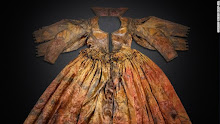In celebrating the current Vanderbilt
family wedding exhibition at the Legacy museum on Biltmore Estate in Asheville,
North Carolina, I’ve written several articles about the treasures on display. One is the recreation of Cornelia
Vanderbilt Cecil’s 1924 wedding gown and veiling by Cosprop Ltd. London (of Downton Abbey fame!)
Here’s another version of that fascinating story just published in the summer issue of Season magazine….and I’ve reprinted it here
for you to enjoy. This one gives a bit of background about my former vintage bridal shop, its Downton Abbey connection, and my love of old lace. Would like to hear what you think!
A Dress Reimagined
by Cornelia Powell
by Cornelia Powell
Those of you who visited my former bridal art-to-wear
shop in Atlanta in the 1980s and ‘90s would remember the lovely one-of-a-kind
dresses made from vintage laces. The shop’s designers used found pieces of
original materials: beadwork, laces, embroidery and remnants from beautiful old
gowns that often became the starting point for a new dress, adding richness and
gravitas that only “something old” could do. (“Elegant recycling” is how one of
my designers described the process.)
Downton Abbey’s
designers relied on similar techniques for many of their costumes including 1920s-era
wedding dresses for the Crawley sisters. (Something you already knew if you’ve
attended one of my costume talks!) Designer Caroline McCall combined vintage
lace panels with new silks to make the column-shaped bridal dress for Mary’s
first wedding; then an antique hand-beaded satin train she’d found became the
design inspiration for Edith’s dress for her “almost wedding” in season three.
In the show’s romantic finale, designer Anna Robbins used a collage of vintage
Brussels laces to create Edith’s “happy ending” bridal gown.
What if the lost wedding dress of a famous heiress needed
such superb designer attention? Cornelia Vanderbilt married on her family’s grand
Biltmore estate in 1924, but years later her satin wedding pumps—aged to a
creamy patina and still trimmed with sprigs of fabric orange blossoms—were all
that remained of her costume. So, with an exhibition in mind, Biltmore
commissioned legendary costumier John Bright at Cosprop, Ltd. London—of Downton Abbey fame—to recreate
Cornelia’s lace and silk wedding ensemble.
Once Leslie Klingner, Curator of Interpretation, and her
team at Biltmore gathered archival photographs and newspaper clippings with
descriptions of Cornelia’s dress (details of her wedding had filled society
columns worldwide), the transatlantic “reimagining” project was on! After a
year of planning, conference calls, lace and fabric samples going back and
forth between London and Asheville, NC—plus seven weeks of cutting and sewing
by a team of five—Cornelia’s dress and veil were, indeed, beautifully
reimagined.
Cornelia Vanderbilt Cecil’s original gown was the stylish
“tabard” fashion of the 1920s: a lace tunic over a silk slipper-satin,
long-sleeve sheath (a design that influenced the gown for Downton’s Lady Mary.)
From the photographs, the lace of Cornelia’s gown, with its distinctive floral
pattern, appears to be an exquisite Duchesse; but fine lace yardage from that
era is rare, so Cosprop cleverly repurposed an antique lace shawl and, although
the pattern varied from the original, the proportions were perfect! Cosprop
also recreated Cornelia’s lace headpiece and voluminous veiling—which had included
her maternal grandmother’s rose point heirloom veil—by appliquéing
hand-cut vintage lace motifs onto yards and yards of custom-dyed tulle.
Cornelia’s recreated wedding ensemble is now on display
at Biltmore’s Legacy Museum. To me it’s a lovely reminder how, in the hands of
inspired designers, bits of vintage laces and trims can be “reimagined” to
enchant us still. ~























Im no expert, but I believe you just made an excellent point. You certainly fully understand what youre speaking about, and I can truly get behind that. Bridal Shop Saudi Arabia
ReplyDelete